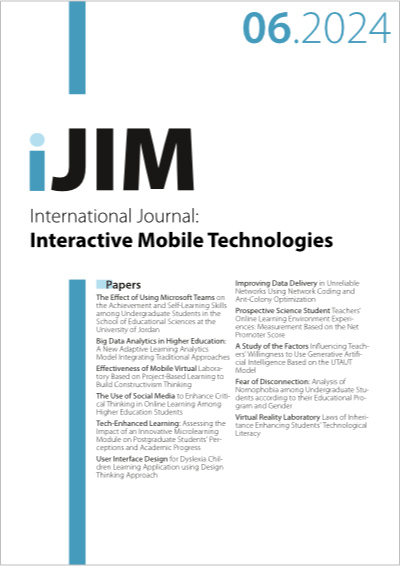Fear of Disconnection: Analysis of Nomophobia among Undergraduate Students according to their Educational Program and Gender
DOI:
https://doi.org/10.3991/ijim.v18i06.45253Keywords:
nomophobia, higher education, university students, academic programs, genderAbstract
In our ever more technologically interconnected and globalized society, nomophobia, or the apprehension of lacking a mobile device, has emerged as a significant concern. This research centered on undergraduate students, a demography particularly immersed in technology, with the aim of assessing the prevalence of nomophobia and its correlation with gender and the academic program pursued by the students. The participants were 320 undergraduate students from four distinct academic programs—Administration (A), foreign trade (FT), public accounting (PA), and information technology (IT). Each program was represented by eighty students, with an equal gender distribution of forty men and forty women. A Spanish version of the NMP-Q questionnaire was utilized to assess nomophobia. A two-way factorial balanced design was used to determine the effect of educational program and gender on the nomophobia levels of university students. A two-way ANOVA test was conducted. The statistical approach helped identify significant impacts related to the academic program (p = .003), gender (p = .001), and the interaction of both factors (p = .064). Based on these findings, the following recommendations are proposed: Academic program-specific support initiatives, gender-sensitive interventions, awareness campaigns and workshops to educate students about nomophobia, continuous well-being monitoring and feedback, training and resilience building. These programs should be available to all students, with an emphasis on high-risk populations.
Downloads
Published
How to Cite
Issue
Section
License
Copyright (c) 2024 Ramon Ventura Roque Hernández, Sergio Armando Guerra Moya, Adán López Mendoza, Rolando Salazar Hernández

This work is licensed under a Creative Commons Attribution 4.0 International License.



